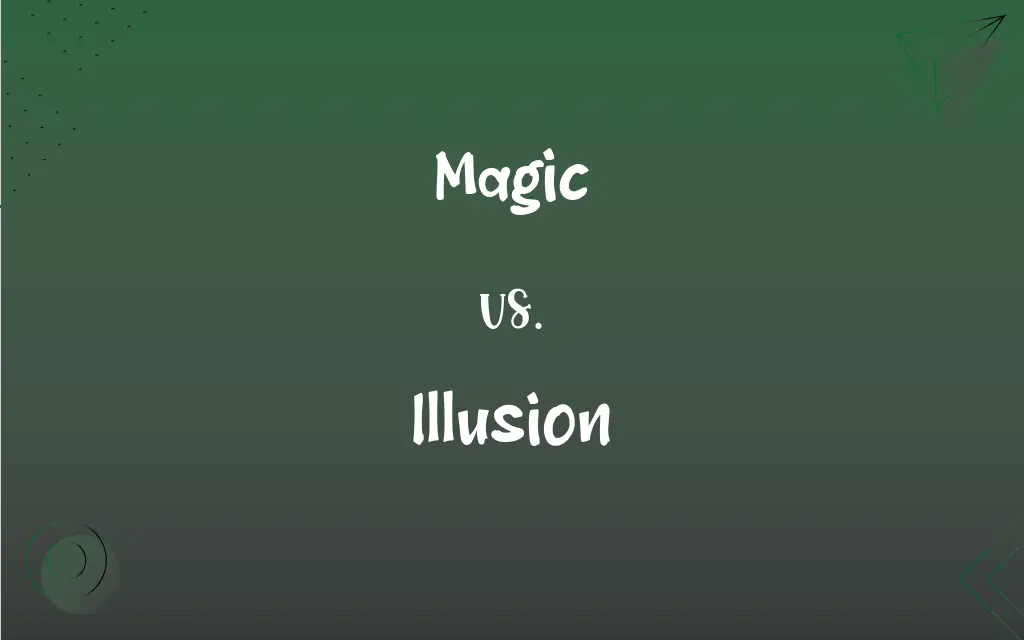Magic vs. Illusion: What's the Difference?
By Janet White || Published on December 10, 2023
Magic refers to the art of producing supernatural effects or manipulating natural forces, while illusion is the art of creating deceptive appearances or impressions.

Key Differences
Magic often implies a supernatural element, suggesting the ability to manipulate natural forces or perform feats beyond ordinary human capabilities. Illusion, in contrast, relies on trickery or sleight of hand to deceive the viewer's senses, creating the appearance of magic.
In the context of performance, magic shows may include a variety of acts that appear to defy logic or physical laws. Illusion, however, specifically involves tricks that are designed to mislead the audience's perception, such as optical illusions or deceptive techniques.
Magic has historical and cultural connotations, often associated with mystical or mysterious powers. Illusion, on the other hand, is more closely related to the skill and artistry of creating convincing deceptions.
In literature and mythology, magic is depicted as a powerful and often mysterious force, capable of extraordinary transformations or events. Illusion, while it can be a part of magical narratives, is usually portrayed as a skill or technique rather than an inherent power.
Belief in magic can be found in various cultures and religions, often linked to spiritual or supernatural practices. Illusion, though, is widely recognized as a form of entertainment, relying on the skill of the illusionist rather than on any actual supernatural abilities.
ADVERTISEMENT
Comparison Chart
Nature
Often supernatural or mystical
Art of deception and trickery
Purpose
May have serious, mystical, or spiritual aims
Primarily for entertainment and amazement
Perception
Viewed as a power or force
Viewed as a skill or artistry
Representation
In culture, linked to mystery and power
In performance, based on sleight of hand
Belief
Can be part of spiritual or cultural beliefs
Generally understood as skilled trickery
ADVERTISEMENT
Magic and Illusion Definitions
Magic
A mysterious and enchanting art form.
The ancient book contained lost magic.
Illusion
A deceptive visual experience.
The mirage was a convincing illusion.
Magic
A fantastical element in stories.
Magic in fairy tales often involves spells and potions.
Illusion
Trickery used in performances.
The magician's greatest skill was creating illusions.
Magic
The ability to control natural forces.
The wizard used magic to conjure a storm.
Illusion
The art of creating deceptive appearances.
The illusionist made the audience question reality.
Magic
Part of rituals and traditions.
The shaman performed magic for healing.
Illusion
A false impression or belief.
The notion of a perfect society is an illusion.
Magic
Something unexplainable and awe-inspiring.
The Northern Lights are like natural magic.
Illusion
A perception that misleads the senses.
Optical illusions can trick the eye.
Magic
The art or practice of using charms, spells, or rituals to attempt to produce supernatural effects or control events in nature.
Illusion
An erroneous perception of reality
Mirrors gave the illusion of spaciousness.
Magic
The charms, spells, and rituals so used.
Illusion
An erroneous concept or belief
The notion that money can buy happiness is an illusion.
Magic
The exercise of sleight of hand or conjuring, as in making something seem to disappear, for entertainment.
FAQs
What defines magic?
Magic typically refers to supernatural abilities or forces.
Is magic used in religion?
Magic has historical ties to some religious and spiritual practices.
Can magic be learned?
In the context of performance, yes; in supernatural terms, it's more mythical.
Are illusions just tricks?
Yes, illusions are clever tricks or techniques to deceive the senses.
Is illusion real?
Illusion is a skilled art of creating deceptive perceptions but not supernatural.
Can magic be harmful?
In folklore, magic can be both beneficial and harmful.
Are there different types of magic?
Yes, ranging from stage magic to mythical and cultural magic.
How do illusionists train?
Through practice, learning techniques, and mastering the art of deception.
What skills do illusionists need?
Dexterity, creativity, and the ability to engage an audience.
Is magic always supernatural?
In cultural contexts, yes; in entertainment, it refers to tricks that appear supernatural.
Is magic a part of history?
Yes, magic has been a part of human history and storytelling.
What makes a good illusion?
A good illusion is convincing, seamless, and leaves the audience amazed.
What is the purpose of illusion?
Primarily for entertainment and to amaze audiences.
Can magic be scientifically explained?
Stage magic can, but supernatural magic is beyond scientific explanation.
Do illusions require special equipment?
Often, yes, like mirrors, props, and lighting.
Is illusion an art form?
Yes, it's considered a performing art.
Do people believe in magic today?
Beliefs vary; some view it as entertainment, others hold spiritual beliefs in magic.
Can anyone create an illusion?
With practice and skill, many can learn basic illusion techniques.
Are magic shows still popular?
Yes, magic shows are popular forms of entertainment.
How important is the audience in an illusion?
The audience's perception and reaction are crucial to the impact of an illusion.
About Author
Written by
Janet WhiteJanet White has been an esteemed writer and blogger for Difference Wiki. Holding a Master's degree in Science and Medical Journalism from the prestigious Boston University, she has consistently demonstrated her expertise and passion for her field. When she's not immersed in her work, Janet relishes her time exercising, delving into a good book, and cherishing moments with friends and family.






































































